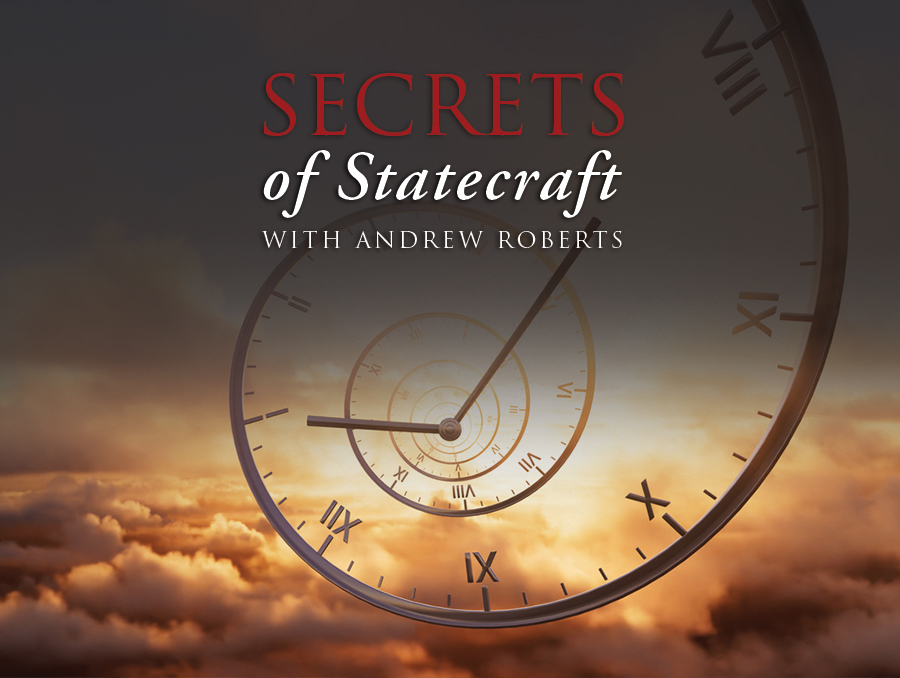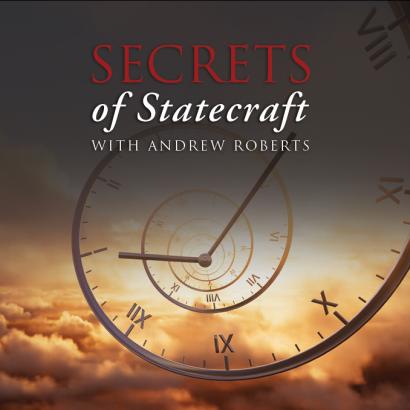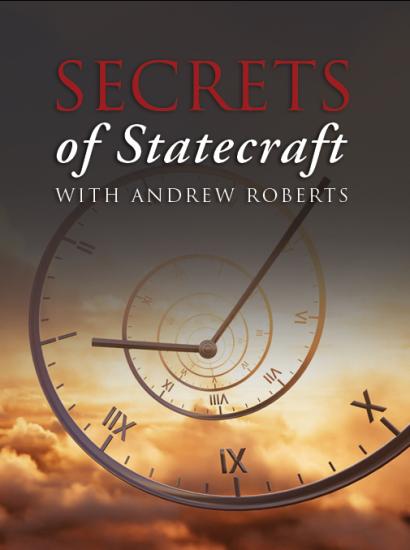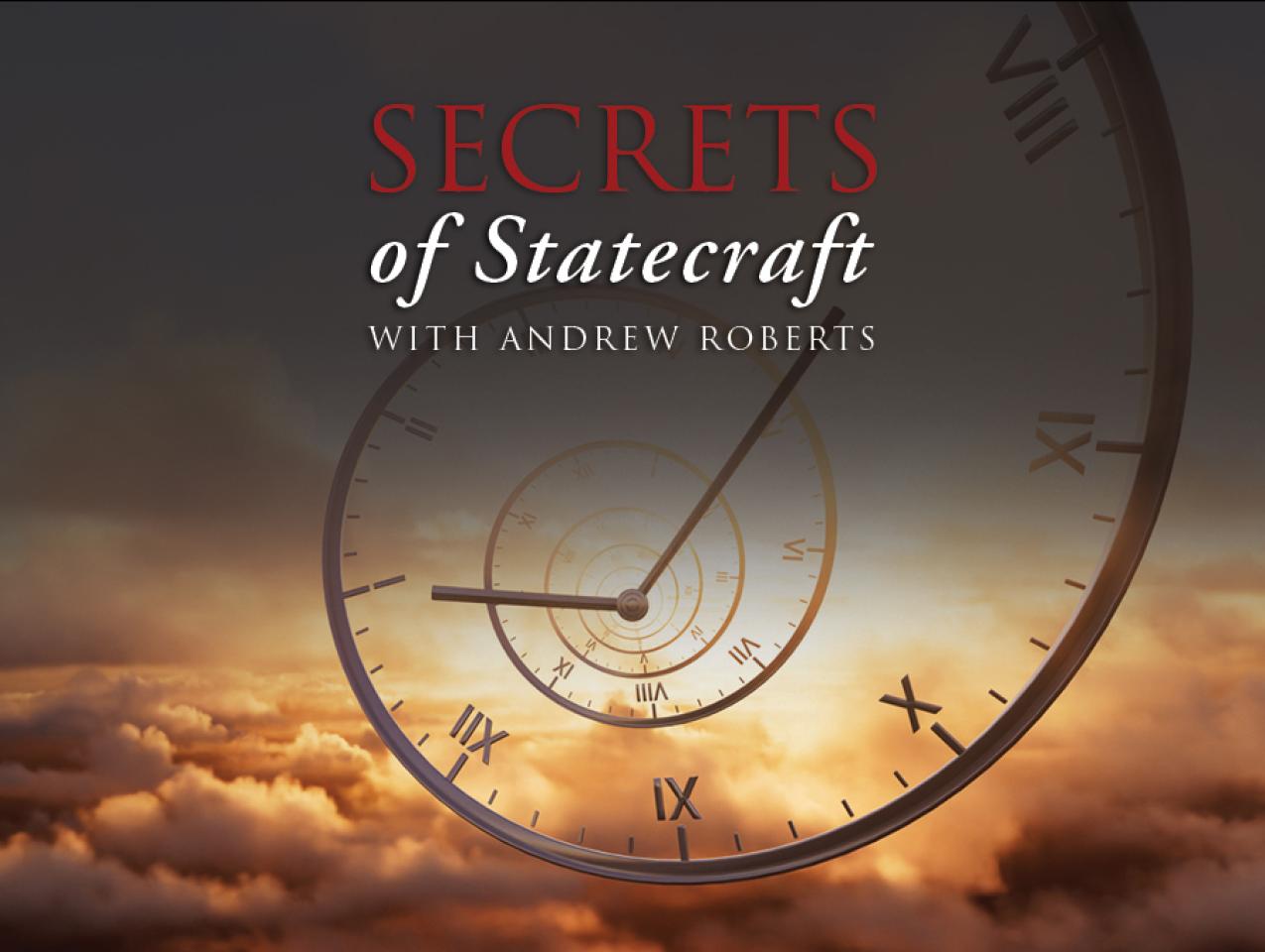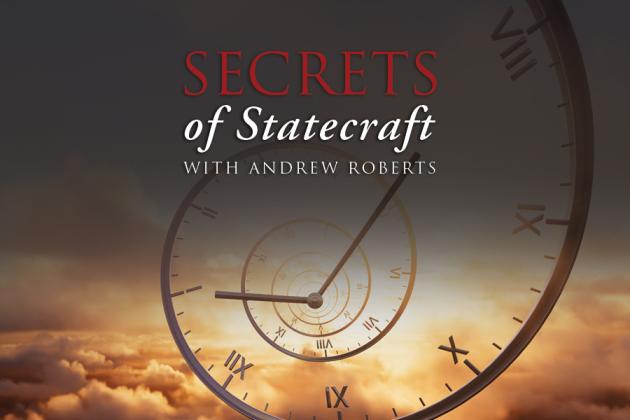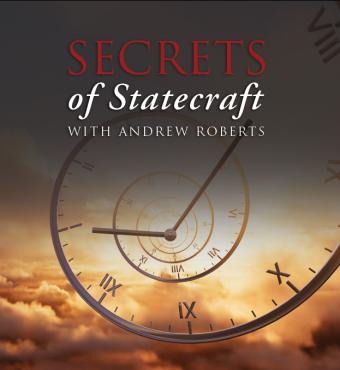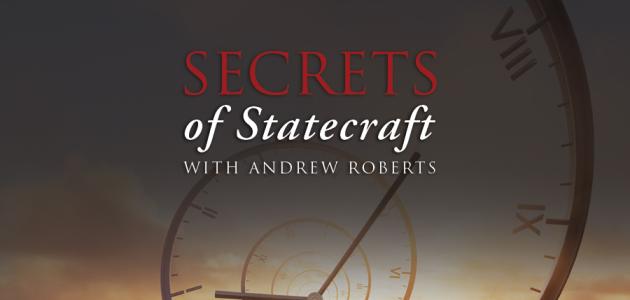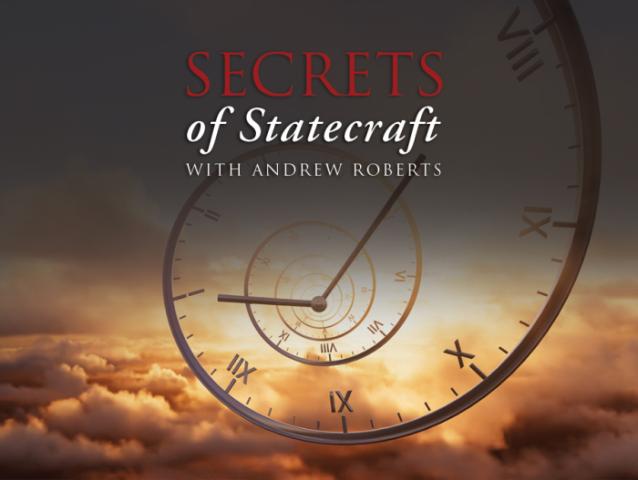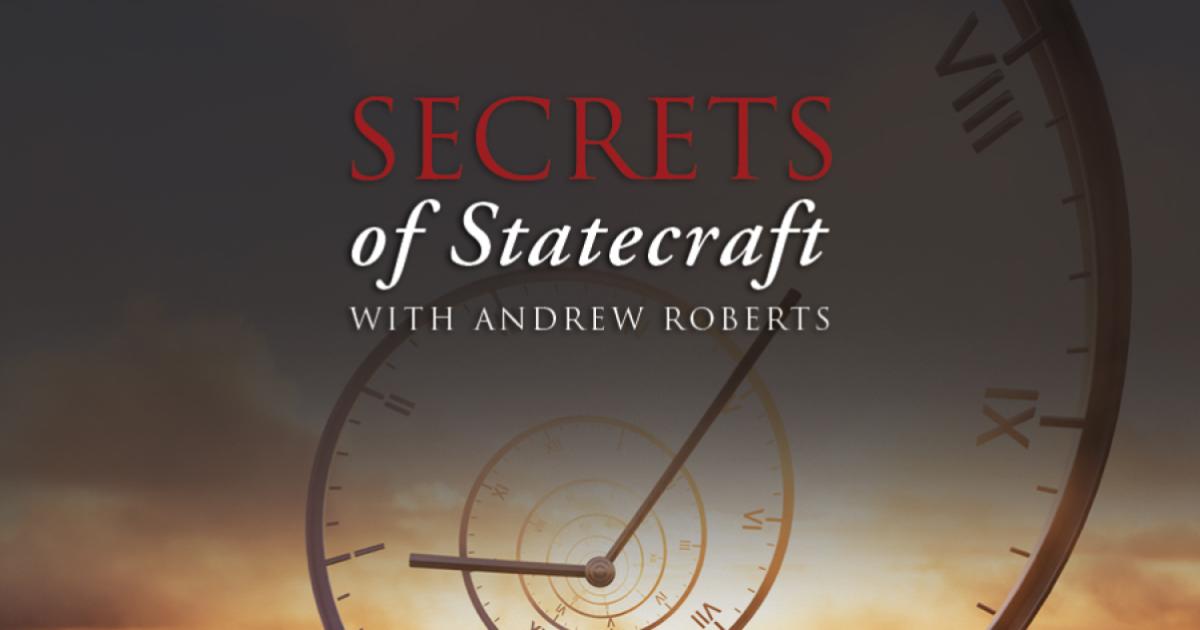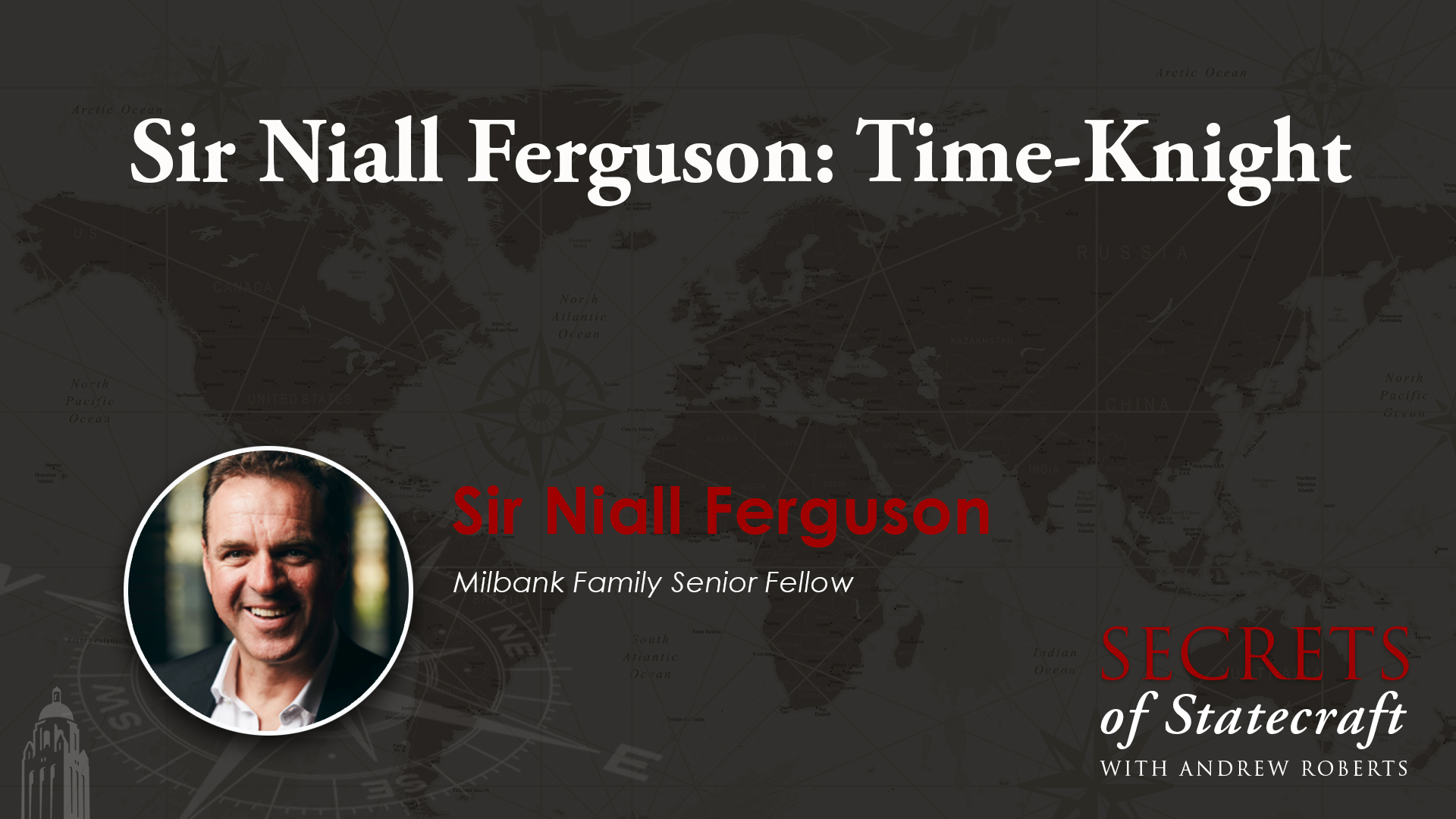- History
- Revitalizing History
Sir Niall Ferguson on time travel, Trump bombing Iran, historical counterfactuals, Doctor Who, The Time Lord, using the past to help the present and future, the University of Austin’s revolutionary experiment, ChatGPT, and God possibly helping to split the atom.
Recorded on June 26, 2025.
WATCH THE VIDEO
>> Andrew Roberts: Sir Niall Ferguson is a world-renowned historian, senior fellow at the Hoover Institution, and a co-founder of the University of Austin in Texas. He's also been a friend of mine for 35 years.
>> Andrew Roberts: Niall, you've described applied history as illuminating contemporary problems with past experience derived from serious study.
Would you like to say anything more about that? I mean, it makes total sense to me. Is this a controversial thing? Is it something that people think anybody shouldn't do?
>> Sir Niall Ferguson: It shouldn't be controversial. At the heart of my philosophy of history is R.G. Collingwood's observation, written in the late 1930s, that the point of what we do is to reconstitute past thought, and then by juxtaposing it with present thought, to illuminate our predicament, which is a nice if somewhat garbled definition of applied history.
But we were warned off it at least certainly at Oxford and I suspect at Cambridge too, by generation of academics who thought that it was slightly vulgar to try to learn lessons from the past. Somewhat journalistic. And so I guess as an academic historian, I've been arguing with a profession that divides roughly equally between those people who think there's simply nothing that we can learn from the past, we should study it for its own sake, in a kind of antiquarian spirit.
And those who are fundamentally uninterested in the past and just want to impose their preconceptions from the present on the past. And I'm sort of stuck in the middle between these two rival camps of antiquarians and presentists saying we really need to understand the past in its own terms.
And when we do that, it will illuminate our predicaments in a way that nothing else can.
>> Andrew Roberts: And as you point out in something you've written recently, the dead outnumber the living on the planet by 14 to 1. So we'd be insane not to try a new use the experiences of 14 extra people, as it were, to help us in our present predicaments.
>> Sir Niall Ferguson: It's odd that we tend to think that we outnumber the dead because the population of humanity is at its peak or close to its peak. But actually, when you roughly work out how many people have ever lived, the dead do outnumber the living, even with our vast numbers today.
And I think one of the great problem of contemporary society is our ignorance of the past. I think that's got worse in a whole variety of ways, not just because of the way that history is taught. I think there's a general disinterest in the past that one can see in our culture more broadly, outside of academic institutions.
And so most people are in fact relying on, when they try to understand the world on a very short sample of the past, namely their own lives and their own experience. This struck me during the financial crisis very forcibly back in 2008, that most of the people who were running the big banks at that time really didn't know much financial history.
They only really knew the financial history of their own careers. And since most of their careers had begun in around about 1982 after the, the great inflation had been slain, and they'd essentially experienced a terrific upswing in particularly the US in the 80s and 90s, and they had had brilliant careers, but they really knew nothing about the nasty decades, the 1930s and 1970s.
So I think applied history is a call to intellectual arms, saying you really do need to take history seriously, whatever it is you're doing. Cuz if you're not properly historically informed, not only are you cut off from the wisdom of all those people who lived in the past, but you also cut off from a vast array of possible histories of possible scenarios that you may confront, that you just haven't confronted yet because you've only been around a few decades.
>> Andrew Roberts: Because there's only one past, but there are any numbers of possible futures.
>> Sir Niall Ferguson: That's correct. There's one past that we can argue about and we can struggle to discern because it's quite hard to reconstruct the past even when it's well documented. But there are any number of futures.
And this, this moment that we call the present is, is like a moment where you stand before multiple forking paths and, and all of these futures have some degree of, of probability or plausibility. We can't know ex ante which, which path we'll collectively go down. And that's really important.
Something I remember reading when I was working along with you on a book called Virtual History many years ago, reading a terrific essay by Hugh Trevor Roper making the point that what we call the past was once the future to the generations of the past. And at that moment of decision, this is extremely important in the world, you know well of foreign policy or of warfare.
The moment of decision, the decision maker does not know what the outcome will be and has before him a whole range of different outcomes that range from triumph to disaster, with everything in between. If you lose sight of that fundamental contingency that is at the heart of the human experience, then you're going to make terrible, terrible blunders because you aren't aware of the full range of paths that you might go down.
>> Andrew Roberts: Yes, you've created making political decisions without knowing history as akin to a game of darts in a darkened room. And that makes perfect sense to me. And the point of what if history, counterfactual history, is that it reminds people that there were lots of different possible future paths, only one of which ultimately obviously was taken.
But nonetheless, the very fact that there were others, that there were other ways that the world could have developed, is an important historical fact in itself, isn't it?
>> Sir Niall Ferguson: We all know that from our own experience, because very few of us are so unreflective, never to ask a counterfactual question along the lines of, what if I hadn't bumped into my wife that night, the woman who became my wife.
We mostly ask those questions in a kind of personal way. Or what if that dreadful thing that happened to one of my children hadn't happened? Or what if it had? I mean, if you don't ask those questions, you're a very unreflexive person. But historians don't like asking questions, questions like that about the past.
And again, we were taught as undergraduates by being made to read E.H. Carr's awful book, What Is History? That was somehow off limits to ask what if questions about the past. But it can't be off limits if we instinctively ask such questions about ourselves. And I think it serves a tremendous educational purpose.
If you think back and say, well, what would have happened in the case of World War II if things had gone differently? If Hitler had risked the invasion of England, for example, or if the Japanese had decided, instead of attacking the European empires and the United States, to attack the Soviet Union?
Those were options that were considered by contemporaries. Therefore they had a reality in the minds of people taking decisions during World War II. And a historian who ignores those things, those options that weren't decided on, that were rejected, is leaving something very important out. I remember seeing a good example of this in the dining room of the US Senate where in a glass case there's a menu.
And on that menu, which dates from around about the time of World War II, I think it's pre Pearl Harbor, a group of senators who'd been lunching together took bets on the duration of World War II. And the bets were tremendously wide, ranging from it'll all be over very soon to it'll still be going on in the 1950s.
So that moment in time, these well informed men in the highest chamber of the US legislature really had no idea how long the war would last. And for that matter, nor did my grandfather, sweating it out in Burma and India, know that eventually in 1945 he'd get home.
I think that's what drives me mad about a lot of bad historical writing, that it leaves that uncertainty out and makes the reader feel that there's only one way it can really go. And you're kind of led through the narrative much as if it were a novel. But I keep telling students it's not a novel.
It's much more like a really unpredictable sporting event. And you'll actually learn more about history from going to see football than reading fiction.
>> Andrew Roberts: And it's political as well, isn't it? E.H. Carr was coming from that angle because he was a Marxist. You get the Whig interpretation, it is naturally Whiggish determinists tend not to have the kind of contingency view of the world that, that you or I would have.
>> Sir Niall Ferguson: There are lots of ways of being a determinist. Reading Carr and thinking about him, I'm not sure he really was that much of a Marxist, but he had a kind of intolerance of the. The contingencies of history. He felt strongly as if there were was one sequence of events, one causal chain, and one couldn't really waste one's time, as he put it, crying over spilt milk or imagining other histories.
If you read his History of the Soviet Union, an immensely turgid work, it's almost as if the spirit of the Five Year Plan infected his view of the historical process, as if it were a series of bureaucratic Five Year Plans. You could be a determinist as an idealist, though you don't need to be a materialist.
And some of the most persuasive arguments against counterfactual history take a kind of idealistic perspective. But you and I know as, as practicing historians who've sat in the archives that, that history is full of contingencies and, and roads not taken and strokes of luck and strokes of tremendously bad luck.
And that's what makes history endlessly fascinating to study. You know this as a biographer, that however strong a sense of his own destiny, Churchill had, and he had a remarkable sense of that there's all kinds of ways in which the path winds and there's no guarantee actually in your account that he is going to be the triumphant leader, victory.
So I sort of struggle a bit with the determinists, because they seem to me to flatten history out and make it a lot less interesting. One of my staunchest opponents, Richard Evans, for a time professor of Regis professor of History at Cambridge, who wrote an entire book against counterfactuals, has always struck me as somebody who eschews them because he's determined to make even the history of the Third Reich somewhat dull, which is a hard thing to do when you think about it.
But even in his three volume history of the Third Reich, I remember to my delight, realizing he can't quite avoid some counterfactual speculations because you can't really write the history of the Third Reich and not consider what would have happened if Hitler had been killed at some stage in the process.
All of those left leaning historians who wanted to write structural functionalist histories of the Third Reich, including the great Hans Mommsen, who once told me after a couple of drinks that his fantasy was a book about the Third Reich that didn't mention Hitler at all in the end, had to admit that he was rather important and his premature death would probably have altered events quite drastically.
>> Andrew Roberts: Let's come to the modern day, especially with somebody who was very nearly assassinated himself, of course, Donald Trump. What can you see as the what ifs, the counterfactuals regarding him?
>> Sir Niall Ferguson: Well, I think it was Marc Andreessen who reflected not long after the events at Butler, Pennsylvania, that that was a drastic, extraordinary fork in the road, that if the bullet had struck Trump and killed him, the, the world would have changed its direction.
And I think that's right. In fact, it's one of those thoughts that still makes me shudder because I think the United States itself would have been plunged into a very dark place if Trump had been assassinated. All of the fears and forebodings Luke Nichter had about the election having a 1968ish feel would have been vindicated, but it would have been even worse than 1968.
It would have been the assassination of a president running for re election. So I think we were very fortunate that the bullet missed. And if that doesn't convince you that counterfactuals are real, it's hard to think what else would. I think there's another counterfactual, though, that's also interesting.
What if he'd won in 2020, which he, of course, insists that he did to this day. How would that have gone? I can't help feeling that it's been very valuable for President Trump and his close advisors to have had four years to think about it all that's only been given to one previous president, Grover Cleveland, a very different man.
The presidency of Donald Trump in its second term is an altogether different thing, because they had four years to learn that they wouldn't have had if they'd won in 2020. And I think winning at the tail end of the pandemic, having to deal with all the challenges of the post pandemic period, without the four years to reflect on what had gone wrong, because not everything had gone right in the first Trump term, that was a tremendously important thing, too.
So as one thinks about the recent past, all kinds of counterfactuals suggest themselves. Tolstoy complains at the end of War and Peace that it's easy to think about these things, about the recent past, but in truth, the further back you go, the less easy it becomes. I think that doesn't invalidate the counterfactual approach.
It just makes you realize that history gets harder the greater the period of time between you and the events you're studying.
>> Andrew Roberts: Because human nature changes or because people think in different ways. When one studies the 17th century, it's hard to believe quite how much religion plays a part in the thinking of statesmen.
Is that it, or do you think that there is a change in human nature that's taken place over the last couple of thousand years?
>> Sir Niall Ferguson: I think the striking thing about the human condition is how little it has, has changed. Otherwise we wouldn't understand Thucydides or we'd be baffled by Shakespeare's plays, and we're not.
The amazing thing to me is that one can make so readily a connection with the ancient world, with the medieval world, even when it they're in the grip of, of religious zealotry with, with the early modern world too. So I don't think that's the challenge. I think the challenge is just that when you're talking about events that happened hundreds and hundreds of years ago or even thousands of years ago, it's harder to think about the counterfactuals because they take you down paths that are really hard to conceive of.
What is the world like if Christ isn't crucified, for example, is just a question we reel from. It's beyond our human minds to imagine a world without Christianity. I think the religious issue you've raised an important one. Having spent most of my life as an atheist, but having recently become a Christian, I realized that part of what impeded my earlier work was that I was impatient with the relig religious preoccupations and doctrines of even the 19th century figures I studied.
And I think back to Jonathan Clark and the hard work he did, or Maurice Cowling and the hard work he did to persuade secular figures like me that really religion was at the back of public doctrine even when it appeared not to be religious. I think that was all dead right.
And I think it's very hard to be a historian and not have some understanding, particularly a historian of the Western world of Christianity. Indeed, I think it probably leads you to wildly wrong conclusions if you don't take religious beliefs seriously.
>> Andrew Roberts: So you're seeing much more when you're looking at history.
You're seeing religion, and in particular Christianity is a much more powerful force than you had been before you converted.
>> Sir Niall Ferguson: Absolutely. Tom Holland's book, Dominion, is very good on this. He shows that Christianity is a kind of omnipresent operating system in the Western world, broadly defined, and that it's even operating when you don't think you believe it.
And that's a really important insight. So this is why the atheists all turn out to be various forms of repressed Christian. Even Richard Dawkins now admits that. And if we're honest about this and start to study our Christian heritage, then we'll understand the the previous generations so much better because we'll no longer be baffled by those many biblical illusions that creep into the correspondence of just about anybody that one studies in any.
In an era before our own strange godless era.
>> Andrew Roberts: We mentioned religious zealotry. Let's talk about the applied history with regard to Iran, the bombing of the Iranian nuclear program last week. How do we see that in terms of applied history?
>> Sir Niall Ferguson: Well, I think this illustrates the point we made earlier.
We can't know at this early stage, and we're talking just days after the. The B2 strikes on Fordo and the other US strikes on Iran's nuclear facilities. We can't know what the consequences will be with much in the way of certainty. We can't know if that is the end of Iran's nuclear program or if it will be hastily reconstituted.
We can't be sure yet of just how much damage the bunker busters did. We can't know if the regime survives and manages to recover from this military humiliation. And so there are multiple paths unfolding before us, one in which this is looked back on 10 years from now as an extraordinary triumph of statesmanship.
A rare occasion in recent times when an American president has had the discipline to use force along with diplomacy, along with economic pressure to achieve an outcome working in concert with allies. That's one, I think, likely interpretation-
>> Andrew Roberts: What would be the historical precedent for that? What would be the piece of applied history that would look closest to that outcome would you say?
>> Sir Niall Ferguson: If I had been advising the president, which I was not, I would have said, think about why North Korea did become a nuclear armed power. What was not done that could have stopped it? And I think one can see multiple moments beginning in the 1990s going right through until Trump's first term when military action might have been effective in a way that diplomacy and sanctions were not.
It wasn't inevitable that North Korea would become a nuclear armed power. But I look back on particularly the presidencies of Clinton Obama as lost opportunities to take decisive action before they'd got there. If you look at what happened in 2017, eight years ago, President Trump used even more ferocious language about North Korea's nuclear program than he ever used about Iran's in the last few months.
But it didn't happen. And so this is one of those cases where, as Lewis Namier said, the really important thing in history is the thing that did not happen, that understanding how things don't happen is as important as understanding how they do. What didn't happen was military action.
It was threatened multiple times. Remember Fire and Fury. I can remember being in Washington shortly after President Trump had said that, thinking, I wonder if he really is going to strike North Korea. And many people thought that he would. And indeed, according to some sources, at least we won't know until the documents are declassified, he had to be talked out of doing it by his chief of staff, General Kelly, and probably also by the state, Secretary of State Rex Tillerson and Secretary of Defense Jim Mattis.
So I think the most interesting way to think about an event like the one we've just seen is to juxtapose the contrasting case when there was no military action and North Korea was able to become a nuclear armed power. That was what we had to avoid with Iran, and we still perhaps will have to avoid it in future.
That's, for me, the most illuminating counterfactual. What if we'd acted early enough to stop the North Korean regime? What if there had been military action taken before it had? The deterrence of missiles and potentially also chemical and biological weapons? The truth was that by the time Trump came in in January 2017, it was too late.
The North Koreans had enough weapons of mass destruction of various kinds to scare the hell out of the South Koreans and the Japanese and people at the U.S Department of Defense. Whereas the Iranians, if they'd looked at this case, they would have realized that their position was taken terribly vulnerable.
Because unlike the South Koreans, the Israelis really wanted the United States to strike them. And unlike the North Koreans, the Iranians didn't really have a weapon of mass destruction with which to threaten anybody. They didn't even have air defenses. Their position was incredibly weak compared with the North Korean position.
And they don't seem to have understood that. That's almost as remarkable as any part of this story.
>> Andrew Roberts: With regard to applied history, what is useful in the Ukrainian sense? We know President Putin's view of history, that the Ukrainians are essentially one people, historical unity of the Ukrainian and Russian people, and so on.
I imagine that very long essay of his wouldn't have got more than about a Delta plus from you, maybe a Delta minus from you teaching.
>> Sir Niall Ferguson: It's a terrible essay, yes.
>> Andrew Roberts: Exactly. But it's important isn't. But it's obviously very important to him, the history that he has convinced himself of here.
How useful is applied history when it comes to the Ukrainian situation today?
>> Sir Niall Ferguson: Immensely, when the war broke out, even before it broke out, right at the beginning of 2022, I remember writing an essay thinking war was coming and directing people to Bulgakov's great novel, The White Guard, which, when it was dramatized, became Stalin's favorite play.
And The White Guard is partly about a brief period of Ukrainian independence at the end of World War I, which is snuffed out by the Bolsheviks. That's almost the last scene of the book. And my point was that historically it's been very hard for Ukrainian independence to endure because of the enormous asymmetry between Ukraine and Russia.
And that asymmetry is still there today. When you look at the difference in population, a factor of four in GDP, a factor of what, nine or ten, Ukraine is highly unlikely to win a prolonged war against Russia. One of the lessons for me that was very important in 2022 was when Ukraine heroically fought the Russians off not only in the Battle of Kyiv, but also outside Kherson and Kyiv.
That was the time that the West should have worked very hard to end the war. Because the long war was not in Ukraine's interest, was not likely to win any more than Finland had been likely to win a long war against the Soviet Union in the case of the Winter War.
So I wrote a lot at that time, complaining that there were people in the Biden administration who seemed to think it would be clever to string the war out, that this was the argument that you may also have heard. Well, this is great. The Ukrainians are doing all this damage to the Russian military machine.
Let's keep it going. Let's have a counteroffensive in 2023. I thought that was crazy. I never thought that counteroffensive would succeed because they didn't have a superiority, nothing like it. And a short war was the only kind of war that would leave Ukraine in a strong position. The failure to try to end the war, which I think will come out when the documents released in the course of 2022, was a very grave error based on a kind of cynicism that was also simultaneously stupid, because Russia had Chinese backing.
Russia not only had its own resources, it also had China's resources, not to mention Iran's and later North Korea's. Whereas Ukraine had to rely on the fickle West, with Europeans ambivalent in many cases about their cause and Americans divided politically, so they could never really be backed to win a protracted war.
Does that mean they're bound to lose? It has to be said that the odds are against Ukraine being able to win a war that drags on for much longer than another year. I struggle to see how that turns out well, but as we speak, I think the sky has somewhat brightened over Kyiv, not least because I think President Putin has overplayed his hand in the negotiations with President Trump.
And has made himself a lot less popular in the White House than he used to be.
>> Andrew Roberts: What about Trump's tariffs? What does applied history tell us about this thing? We know that he admires President McKinley and thinks that 1896 was the last year when America was truly great.
People have equated him with Andrew Jackson. What does applied history tell us about him in the domestic sphere?
>> Sir Niall Ferguson: Well, I was no fan of Liberation Day, of April 2nd's reciprocal tariffs, because they were so madly high and apparently arbitrarily calculated. Applied history here has to join force a bit with economics.
I'm probably one of those people who's too steeped in Adam Smith not to have a predisposition in favor of free trade. On the other hand, I know enough American history to know that tariffs have a long and rather distinguished track record as a revenue source for the federal government.
And I think a lot of the people who are most anxious in April, including me, were underestimating the extent to which this will generate a significant source of revenue. The latest data show that it really will be perhaps 1% of GDP in terms of revenue, and that's revenue the federal government could use, given that it's 6% of GDP deficit is really unsustainable.
I think the other lesson of history is that the United States is a pretty large economy that isn't as reliant on trade as most other economies. And so in a trade war, it has a kind of upper hand. The trade war in the first Trump term hurt China more than it hurt the United States.
I think that's probably true. Again, I think most other countries are at a fundamental disadvantage if the United States decides to behave this way. So I think if one sort of applies history, one can see a, where Trump is coming from. Why he is part of a rather 19th-century American tradition in the same way that he has a populist tradition to draw on with respect to immigration or even with respect to monetary policy.
He's a very American figure, Trump. That's why when people like Tim Snyder say he's Hitler, he's Mussolini and scarper off to Toronto, I'm shaking my head thinking that's just terrible applied history. You're just committing a massive category error. If you think Trump has anything in common with interwar dictators in Europe, he's a very American figure.
The tariff is part of that. And one underestimates his ability to use these rifts, if you wish, from American history in ways that A, resonate with voters and B, exploit the powers of the United States. The United States has a whole bunch of asymmetrical powers. It's very attractive to people.
They want to come there. It's very, very good at raising capital. It has uniquely broad and deep capital, and it's much less reliant on trade than most of its trading partners. So I guess my takeaway is once he had walked back the really crazy tariffs on April 9, deferred the reciprocal tariffs and started to walk back what was in effect a trade embargo on China.
The dangers diminished, and it began to play to America's strengths again.
>> Andrew Roberts: There's something called Ferguson's Law, isn't there, where applied history really does get applied to America, and America's place in the world, and America's place in history. Talk us through Ferguson's Law, if you will.
>> Sir Niall Ferguson: Well, back in January, I wanted to write something that drew everybody's attention to the unsustainable fiscal problem.
And I wanted to try and put it in language that wasn't too technical. At root, I'm by training a financial historian, so I, I probably are more conversant with the intricacies of the bond market than the average historian. But what I wanted to convey was a very simple idea.
And the idea which I expressed as Ferguson's Law, named after Adam Ferguson, the 18th century Scottish philosoph, not myself. The law says if a great power is spending more on interest payments on its debt than on defense, then it won't be great for much longer. The beauty of Ferguson's Law is that it applies to all the empires going back to the empire of Castile in the 16th and 17th century.
It applies to the Dutch Republic in the 18th century. It applies to France Bourbon France in the 18th century. It Applies to the Ottomans in the 19th century as well as the Habsburgs. It applies to Britain in the late 20th century. It's just a great quick and dirty way of capturing the dangers of public debt if you're trying to run an empire because it's easier to add to the debt and the debts always tend to climb and they get mountainously high.
But if you allow the interest payments on the debt to exceed the amount of money you have available for your Army, your Navy and Lassiterly or Air Force, trouble lies inevitably ahead. So I thought that was a neat way of getting an essential point about financial history across to a lay audience and perhaps even to a president.
>> Andrew Roberts: Yes, now by all accounts, it's done both of those things. You mentioned earlier We were talking about the ignorance of history and the dangers of it. The way in which you've explained how important applied history is to the understanding of present day problems makes it clear that ignorance is extremely dangerous and also charlatan are extremely dangerous too.
A classic example being Daryl Cooper, who on Tucker Carlson's show just came up with the most extraordinary load of tripe about the Second World War. What can be done about this? What's the best thing? Because you've said that most podcasts have the all the rigor of pub banter, so it's not going to be podcasts that exposes the charlatanism of people like Daryl Cooper.
What can be done?
>> Sir Niall Ferguson: I wish There were a simple answer to that. The Internet has many benefits, but also many costs. That was one of the themes of a book called the Square in the Tower that I wrote back in 2016. And the problem about the Internet is that the barrier to entry vanishes and everybody can be a historian and publicize their mad theories.
And the real defect is that the algorithms incentivize people to generate clickbait. And so Daryl Cooper is the historical equivalent of those stories that the tabloid papers run in such large numbers that are untrue but highly engaging. So of course it's untrue but engaging to say Churchill was the real villain of World War II.
The the Germans acted in some kind of self defense. The Holocaust was a bit of an accident because the Germans on the Eastern front didn't have quite enough food to go around. You can say those outrageous, mendacious things. And the Internet promotes the outrage, incentivizes people to pay attention, because the business model of the Internet is to sell ads.
Tucker Carlson's podcast runs partly on that basis as well. No doubt is money from Qatar and one of the best things about recent events has been that he has been in some measure discredited. And I hope that the discredit spreads to those who've been featured and promoted on on the podcast.
The only real antidote to to bad histories is good history. Of course there's aggression's law at work, where the bad history drives out the good but one can at least say to one's children, don't listen to that. Read this. I think history has to be read. I think it has to take the printed form, because without the printed form, the necessary apparatus that makes verification possible can't exist.
No footnotes in a podcast and so I think we have to recognize that history, if it's to work and survive as a discipline, we'll need to inhabit what I increasingly think of as the cloister. The cloister where real learning survives during the kind of nuclear winter that the Internet and artificial intelligence are creating out there in the wider world.
>> Andrew Roberts: Well, you've also created your own cloister, haven't you, with the University of Austin? That's a, a specific attempt, isn't it, to teach genuine history and to engage with the charlatan form of history and obviously to encourage people actually to read. It's the kind of it does have footnotes, isn't it?
Tell us about the University of Austin.
>> Sir Niall Ferguson: Well, about four years ago, a group of us were feeling very dissatisfied with the state of the established Universities, especially the elite institutions. The one I knew best was Harvard. I recently moved to Stanford and hadn't been massively impressed there either.
My sense was particularly history departments were increasingly being politicized and standards were also being lowered, not least in the amounts that undergraduates were expected to read and the quality of work that they were expected to produce. I came to the conclusion that one could not reform the established institutions, therefore one had to build anew.
And my observation, again, this was applied history, was that this had happened before and been very successful. In the late 19th century, frustration with the Ivy League had led to the creation of new universities at Chicago and at Stanford itself. And it's the United States. My message to my friends was, we're Americans.
We should build a new university when the old ones seem to have failed. And so we began the work of creating the University of Austin. I'm proud to say that in a very short space of time, we were able to open its doors. And our first class has just left town for their summer vacation.
And our second class will be admitted at the end of the summer. It's no mean feat to create a new university. There are many barriers to entry. There's an entire cartel, if you like, which makes it difficult. And the system of accreditation has all kinds of Catch 22 features, such as you can't fully be accredited until you've graduated your first class, which in the US means that you've got to spend four years attracting students to a not yet fully accredited institution.
That isn't easy. It's a challenge, but it's a challenge that we've risen to. And one of the things that convinces me that we'll succeed is just the atmosphere in the classroom, the quality of students that we've attracted. There are many, many young people who must feel the way our first class felt when they decided to take a chance.
The established institutions, the established educational culture is just so moribund that it's worth taking a risk on free thought, on real academic freedom, and on an institution that's purely meritocratic, that is only interested in your intellectual performance and not really in anything else. So I'm excited about it.
It has been at times a daunting and even exhausting exercise. But the thing that convinced me we'd done the right thing was the class that I co taught this past term on the philosophy of history with the excellent young scholar Brandon Dedman. And that's a serious class, and I don't think it exists anywhere else.
A class that is purely dedicated to understanding the philosophy of history from the ancient world. Right up until contemporary writing, it was difficult. It involved a lot of reading and reading that was at quite a high, intellectually challenging level and it was such a pleasure to teach those students and see their excitement as they first encountered, for example, Tacitus, how Tacitus thinks about the end of the Roman Republic, that then I could see the light bulbs metaphorically going on above, above their heads.
You do need to be a bit of a cloister. That was my insight as I thought about the impact of artificial intelligence on educational culture. I don't know how many people realize outside the universities just how devastating ChatGPT has been for scholarship. Students now routinely assign the reading, thinking and writing to ChatGPT.
The overwhelming majority of assignments that are handed in if they're done electronically outside of examination conditions are not human generated. And this is a huge problem because a generation is losing the ability to rethink and write. And at the University of Austin, we're going to do something about that.
I think the established institutions will just go with the flow because the line of least resistance is just to pretend that the students are writing the essays. And presumably at some point the professors will pretend that they're grading them.
>> Andrew Roberts: And presumably also ChatGPT is therefore banned at the University of Austin.
>> Sir Niall Ferguson: I think a ban isn't the right approach. I think what you have to do, and I made this argument at a lecture I gave there recently, is create a cloister. For seven hours a day, the students have to be cut off not only from artificial intelligence, but from the Internet, from all electronic devices.
They must, in the cloister, only read books, and use pens and papers. But outside the cloister, we must expect them to learn to use the tools of artificial intelligence. With artificial intelligence, it's all about having the intellectual rigor to ask good questions and the discernment to recognize when the AI is lying or hallucinating, as the professionals like to say.
So if you've spent time in the Cloister, you can do that. When young people are allowed to do everything with AI, they're never going to learn a darn thing. And there already is some evidence that it does meaningful neurological damage. But I think if one can create an environment in which, for part of the day, one is truly in the cloister, that's the answer.
I think prohibition won't work. I think it's a world in which you can't simply retreat from it. But if you equip people intellectually to make use of these tools, rather than simply to delegate thought to them, we have a chance.
>> Andrew Roberts: Fantastic. Well, many congratulations on this, and good luck.
There are a lot of historians like me, I have to admit, that whinge and whine about the problems with history, but there are very, very few who actually do something about it, let alone set up a university. So that really is something to you to-
>> Sir Niall Ferguson: No good deed goes unpunished, you'll be glad to hear I've already paid heavily in some in lost sleep, but I think it's well worth it.
And even if there's only one institution that is doing it right, that's actually enough. One other thing I learned from studying the history of networks is that one really good institution can be absolutely transformative through network effects. So it may seem too small to succeed, but that's to misunderstand how human history works.
The Scottish Enlightenment was the work of a very small number of people, but they were incredibly well plugged into a network of thinkers. So that Smith's work, for example, could spread across the Atlantic and around the world and inform the way everybody who was literate thought about economics within just a few decades.
So small can be beautiful as long as it can project great ideas through the network.
>> Andrew Roberts: What history book or biography are you reading at the moment? I imagine you're reading dozens of them, but just choose one.
>> Sir Niall Ferguson: There was a few on the go. David Hume's History of England.
I realized that as a product of the Scottish Enlightenment, I lent more heavily on on Smith and more recently on Ferguson, than on Hume, partly because I'd only have been given Hume's philosophical writing to grapple with, and I'm too stupid to fully understand philosophy. I'm such a concrete person that abstract ideas bewilder me.
So Hume as a historian is a delight. He's funnier than Gibbon, sometimes laugh out loud, funny. But he's also a Tory whose entire attitude to the history of England is that there is a really something preposterous about the succession of kings. And there's no Whig direction animating events, but mostly human folly.
The chapter I adored particularly was his chapter on the Crusades, which the opening lines of which I really ought to memorize because they're so exquisitely funny and along the lines of in all of the pages of human history, nothing quite so preposterous has been recorded as the Crusades.
And so Hume is just wonderful. I read Hume the way that naughty boy in Narnia eats Turkish Delight when the White Witch gives it to him. It's delicious.
>> Andrew Roberts: And your counterfeit, your what if? For a man who's written books about what if, it must be difficult just to choose one.
But you're only allowed one, I'm afraid, Niall.
>> Sir Niall Ferguson: Well, we did one already, which I'm fascinated by the North Korean what if? And we did another one already, which is the Butler, Pennsylvania what if? I think the most interesting what if that I've thought a lot about recently has to do with technology in World War II.
I mean, there really are a couple of extraordinary things that, that set the Allies apart in the end from their adversaries. One is what happens at Bletchley park, and the other is the Manhattan Project. I was rather proud of my son Thomas, who was asked in a debating competition to pick the most important place in history.
Then he picked Bletchley park with no prompting from me whatsoever but I'm going to say the counterfactual of the Manhattan project's failure. One just assumes it was going to succeed because so many brilliant physicists converged on the, on the project. And we now have a narrative of Oppenheimer's genius cinematically portrayed by Cillian Murphy that's irresistible.
Nobody has paused, I think, to ponder sufficiently how easily it might not have worked and what that would have meant. How long would the war have lasted under those circumstances? How bloody would the fall of Japan have been? I think more and more, Andrew, that the real point about history is the human nature doesn't change much.
As we said earlier, we can understand Thucydides and Shakespeare, but the technology changes. It changes so much. And that's the thing that you have to keep in mind when you're doing applied history. The lust for power is the lust for power, but the means of achieving power changes.
So much so that I now read almost as much science fiction as history to try to get my head into the likely discontinuities. And the atomic bomb is the great discontinuity of the 20th century. Orwell sees it immediately, writes an incredible essay in the Tribune days after Hiroshima and Nagasaki, saying there will be a cold war.
He coins the phrase there'll be three powers with atomic weapons and they won't be able to fight one another because of the destructive power of the weapons, but they will be able to rule the rest of the world and impose slavery on their peoples. And that's the outline of the plot of 1984.
But imagine if it hadn't worked.
>> Andrew Roberts: Or imagine if it didn't work with the American scientists in Los Alamos, but it does work in the Soviet Union. They had plenty of very brilliant scientists, including nuclear physicists, who by say, 1948, 1950, while Stalin's still alive, they get the bomb and we don't.
I mean, obviously in 1949, when they did get the bomb, it was largely because they stolen it from us, but nonetheless-
>> Sir Niall Ferguson: Or the counterfactual of the what if the Germans, who had been the leading scientific power of the interwar period, had got the bomb? Luckily, Hitler had driven out the best of the physicists with his racial policies.
But I think that's a counterfactual that, that we don't spend enough ponder time pondering because we just assumed that it was bound, that it was bound to work when it worked. Whereas I'm not sure that that's necessarily the case. And that seems to me so much the great cesura, because after that, as Orwell saw Vision for war is ever the same when nuclear weapons are involved.
>> Andrew Roberts: There is-
>> Sir Niall Ferguson: That's the kind of actual I'm haunted by.
>> Andrew Roberts: There are some that I don't know how much of a Christian you are in this case, who actually see the hand of God in the fact that the Allies managed to discover this incredible new, unbelievably powerful weapon at the time they did, and managed therefore to end that most appalling bloody 50 million dead war.
Do you go so far as that?
>> Sir Niall Ferguson: One can't know, but one can't rule it out. The whole point about divine agency is that it is beyond our comprehension. That that's why, as Hume says, Hume's quite explicit about this when he's talking about Joan of Arc. We historians can't enter into that realm.
We can only work with what we can know. But unlike Hume, I have religious faith and so I can't rule it out. It certainly was providential in the sense that it shortened the war, averted the need for a second D day and even bloodier one, most likely for the American forces that would have had to storm Japan.
Yes, I think one has to acknowledge that possibility. I was much influenced by, by Tolkien as a, as a schoolboy and revisiting Tolkien's writing, understanding the depths of the, the Christian faith that informed his conservatism. One sees it in a new light. One sees what Mordor really represents, what the Shire and the Hobbits represent.
So, yeah, I mentioned science fiction earlier. I think there's room also to, for historians to read works of fantasy if they inform us, as Tolkien's writing does inform us, of the mentality of, of the conservative in the midst of the mid 20th century horrors. His letters to his son are so good.
Highly recommended reading once you've finished Hume.
>> Andrew Roberts: And you also, as a schoolboy, loved Doctor Who, the famous Time Lord, the form of time travel we call the study of history you write about at one stage. I don't know whether Americans know about Doctor Who. So very quickly can you sum up the fascination, cuz I love Doctor Who too as well, obviously.
Why is it fascinating for historians?
>> Sir Niall Ferguson: The BBC has many flaws. It has many flaws, the BBC, but it produced Doctor Who. And for that, it can be forgiven all its other sins of omission and commission, all superheroes in the United States are excessively muscular and rely at some point or other on brute force.
Doctor Who is the only superhero who is a nerd, who is an intellectual who never uses brute force. He always uses intellect and he's a time traveler. That's his defining superpower, that he can travel through time. As a small boy, I was fascinated by Dr. Who's ability to go into the past and into the future.
And in that sense, subconsciously, I always wanted to be a Time Lord. The only way you can do time travel, in fact, turns out to be through studying history. My friend Victor Pinchuk says you can do it by drinking old wine. And I agree that it's nice to travel back to Bordeaux 1987 of an evening.
But time travel, in the sense I understand it, is the imaginative leap into the world of the dead, the entry into their experience that is possible from the things they left behind, mostly documents. Time travel into the future is the enormous imaginative leap of, of thinking, how will we humans cope with technologies that we haven't yet discovered?
And I'll say a plug here for my friend Neal Stephenson, the greatest living science fiction writer who's been tremendously good at foreseeing technological discontinuities. He coined the phrase the Metaverse in Snow Crash. He was ahead of crypto with Cryptonomicon, so I read Niall Stevenson when I'm trying to travel into the future.
And otherwise, it's historians who allow us to go back in time. And that is a huge privilege, that we can travel in time in our imaginations. You, Andrew, I envy in many ways, because you, more than any other living human being, have been with Churchill. You have walked with him and you have reenacted in your imagination his extraordinary life with its highs and its lows.
I was driving with my younger sons one afternoon and wanted to keep myself awake and educate them, and so I just played them Churchill's wartime speeches, which remain perhaps the greatest achievements of rhetoric in the English language. But you've been there more than anybody else. You've actually been there in a way that I, I do envy.
I've been in some interesting places too, as a historian, but perhaps none is quite as thrilling as to have been with Churchill during World War II.
>> Andrew Roberts: And I dream about him rather a lot as well. So, Niall Ferguson, thank you for coming on this podcast, which I hope has been more rigorous than pub banter.
>> Sir Niall Ferguson: Well, a very good pub.
>> Andrew Roberts: Thank you, Niall. On the next episode of Secrets of Statecraft, my guest will be another historian, Lord Conrad Black, author of a groundbreaking political and strategic history of the world.
>> Speaker 3: This podcast is a production of the Hoover Institution, where we advance ideas that define a free society and improve the human condition.
For more information about our work, or to listen to more of our podcasts, or watch our videos, please visit hoover.org.







